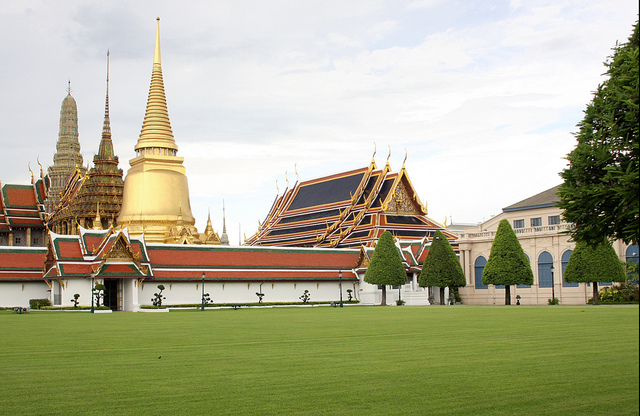Thailand’s Newest Charter – A Quick First Look

After two months of frustration and anticipation, the Interim Charter was signed by the King on July 22, 2014, ending Thailand’s political vacuum. The National Council of Peace and Order (NCPO) claims it is the first step in the roadmap toward restoring democracy. But the document itself is simply a compilation of undemocratic features commonly spotted in previous non-democratic constitutions.
The Interim Charter tries to incorporate some democratic sentiments into its text. Rights, liberties, human dignity, and equality that have been recognized under the constitutional custom and international obligation are still guaranteed in Article 4. But the rest of the Charter defeats those same democratic characteristics. Article 41 exempts the National Council for Peace and Order (NCPO) members from complying with any prohibitions or qualification of public office holders. Such an exemption means that the junta is not required to declare its assets or avoid conflicts of interest. Moreover, Article 44 vests in the junta the absolute power to do whatever they deem necessary to further the public interests. This clause is similar to the notorious Article 17 of the 1959 Charter which enabled the Field Marshall Sarit to violate human rights and suppress dissidents for decades. The final clause, Article 48, provides universal immunity for any action of the NCPO, both in the past and in the future. As a result, the NCPO is a de facto supreme leader, upon whom the rule of law is not enforced.
The Charter creates four all-appointed bodies as the key foundation of moving Thailand forward: the National Reform Council, the National Assembly, the Cabinet, and the Constitutional Drafting Committee. These four all operate under the supervision of the NCPO.
The major policy-maker is the National Reform Council, who must propose reforms on several fronts including politics, public administration, law, education, economy, energy, public health, and mass communication. The goal of the reforms is to establish a free and fair electoral system, install efficient anti-corruption measures, eradicate economic and social inequality, create sustainable development, and ensure fair law enforcement. The Council must advise the National Assembly of necessary legislations and make a recommendation to the Constitution Drafting Committee. This recommendation serves as an outline for the new constitution. The Council comprises of 250 members: a representative of each province and experts from different fields, all appointed by the NCPO.
The National Assembly acts as the legislative branch. The NCPO handpicks 200 experts from the public sector, the business sector, the civic sector, the academic sector, and other sectors useful for the Assembly’s operation. The Assembly nominates the prime minister. The Cabinet is subject to legislative oversight but the oversight is moderate. A minister retains the right not to answer any question deemed inappropriate. Moreover, a debate is permissible but a vote of no confidence is not. However, a cabinet can be removed by the National Assembly if the NCPO proposes so.
The Constitution Drafting Committee undertakes the drafting of the supreme law of the land. Its 36 members include a head nominated by the NCPO, twenty members nominated
by the National Reform Council, and five each from the National Assembly, the Cabinet, and the NCPO. All of them must be approved and appointed by the National Reform Council.
Upon receiving a recommendation from the Reform Council, the drafting committee must finish the draft within 120 days. The draft is then sent for consideration to the Reform Council, the Cabinet, and the NCPO. If the Reform Council votes in favor of the draft, the head of the Reform Council shall seek royal confirmation. The whole process is to take no more than 300 days. Adherence to the timeline is strict. Should they fail, another set of committees will be appointed and undertake the duty in their place. Notably, the drafting committee must take into consideration public opinions, but no referendum is required, unlike the 2007 Constitution.
As to the actual content, the junta has declared three main goals of the new constitution. First, it must establish a corruption-free state. Second, all state apparatus must enjoy independence from any undue influence. Third, populist policies must be forbidden. Above all, the most important mandate for the upcoming constitution is that not only must it be democratic, but also “compatible with Thai context,” a confusing and ambiguous phrase that leaves much room for abuse.
The Interim Charter can be described as intolerant as it obviously demonstrates the junta’s loathe of politicians. Any person who was a member of a political party up to three years prior to the enactment of this Charter shall be ineligible for any position in the four aforementioned bodies. Moral absolutism can be detected in the language, which recites the need to eradicate corruption and to permanently ban from political activities any person convicted of corruption. It expresses distrust in ordinary people, whom the junta believes are too immature to understand “true” democracy. Only technocrats are allowed to be appointed. Eligibility for the Premiership requires a bachelor’s degree. The Charter is built around the fear of the Shinawatra regime.
In reality, the Interim Charter makes no difference. A small band of elites commands Thailand’s political field. Opposition will be suppressed. The greatest human rights abusers are getting away with impunity. Effective checks and balances are absent. The future of Thailand’s democracy is murky as ever.